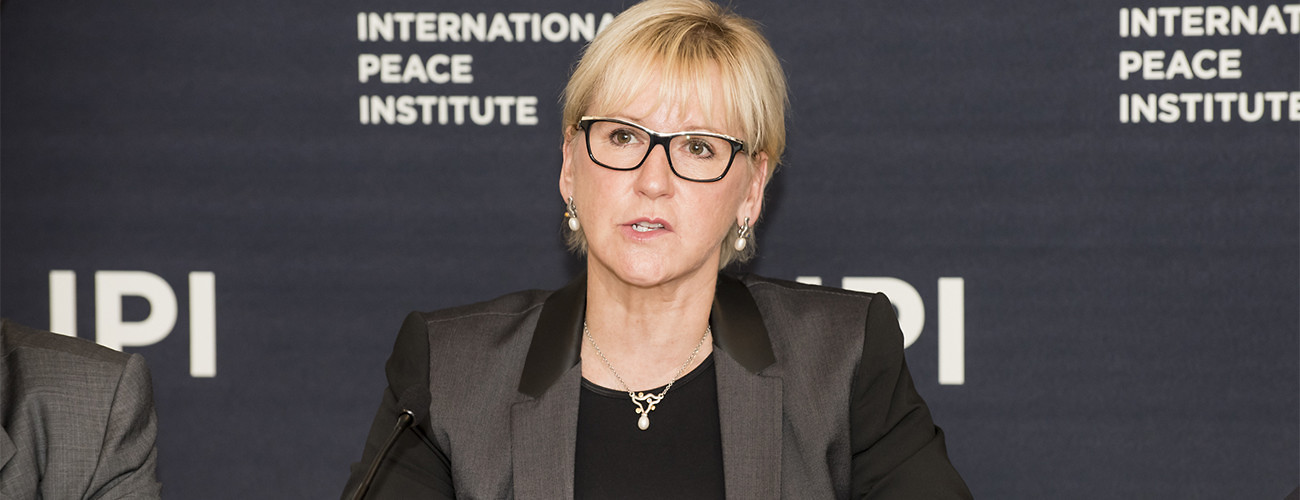A high-level panel of foreign ministers and United Nations officials offered suggestions for creating sustainable peace at an IPI event entitled “Champions for a New Approach to Peacebuilding,” on September 29th, 2015, during the opening week of the UN General Assembly.
Margot Wallström, Foreign Minister of Sweden, emphasized the centrality of peacebuilding to the UN’s work. “I want a UN that puts sustaining peace back at the core of its business, through ramping up conflict prevention capacity, adopting a more holistic approach to peacebuilding, and also, ensuring that all engagement is built on thorough political understanding,” she said.
Ms. Wallström also urged member states to demonstrate their commitment to peacebuilding, and to focus their effort on prevention. “We are currently spending billions of dollars on humanitarian aid and peacebuilding,” she said. “We need to invest more in conflict prevention.”
Mogens Lykketoft, President of the UN General Assembly, also stressed the importance of sustaining peace, but added, “The continued fragmentation of the UN, from a policy and operations perspective, but also from a financial one, has become a significant draw on the ability of the UN to engage efficiently and effectively in this area.”
Gert Rosenthal, former Permanent Representative of Guatemala to the UN, and chair of the advisory group reviewing the UN peacebuilding architecture’s intervention, made three recommendations. Peacebuilding, he said, happens “before, during, and after” a crisis, and does not only occur in post-conflict countries. Second, peacebuilding occurs on the ground, and the role of the UN should be to enable peacebuilding by domestic actors. Finally, he concluded, “You can’t have peace without development or development without peace.”
Samura Kamara, Foreign Minister of Sierra Leone, said his country could be “a blueprint for Peacebuilding Commission engagement in post-conflict countries,” but noted the country had recently experienced unforeseen shocks: an outbreak of Ebola, a decline in the price of commodities like iron ore, and mass flooding.
Mangala Samaraweera, Foreign Minister of Sri Lanka, gave his country’s perspective of peacebuilding in the aftermath of his country’s bloody civil war. “Reconciliation, as you know, will take time, but it is a vital tool in the peacebuilding arsenal and it is important,” he said.
In August 2014, Sir Lanka’s President Mahinda Rajapaksa prevented the UN Human Rights Council from investigating alleged war crimes committed during the final phase of the decades-long conflict with Tamil Tiger rebels in 2009, citing a violation of sovereignty. In January 2015, however, Mr. Samaraweera noted Sri Lanka elected a new president, Maithripala Sirisena, and reconciliation is at the top of the administration’s agenda. Reconciliation’s “importance cannot be overstated,” he said. “In Sri Lanka, it includes truth-seeking, justice, reparations, and non recurrence—truth-seeking not as a witch-hunt but as an effort to heal and forgive—and in the interest of justice, rule of law, and accountability.”
Mauro Vieira, Foreign Minister of Brazil, highlighted the importance of resources in bringing prevention back to the center of UN business. “Despite progress, the UN still dedicates too many financial and human resources to dealing with crisis management, and far too little to avoiding armed conflicts, and ensuring they do not happen again,” he said. “As the international community struggles to deal with the urgency of now, we leave unattended the emergencies of tomorrow.”
Mr. Vieira said financing for peacebuilding was another critical issue. “While countries emerging from conflict need significant financing over extended periods, financing for peacebuilding activities remains scarce,” he said.
Georges Chikoti, Foreign Minister of Angola, agreed resources were an important consideration in peacebuilding reform. He summarized some recommendations of the Peacebuilding Review, stating, “The financial constraints are also to be dealt with by mechanisms to ensure predictability, resource mobilization, and better cooperation between the UN and international financial institutions such as the IMF and World Bank.”
Oscar Fernandez-Taranco, UN Assistant-Secretary-General for Peacebuilding, delivered a statement from Secretary-General Ban Ki-moon to the panel.
Among the points he made was that unless the UN addresses the “lapse and relapse into violence, we will condemn the peoples of this world to continued suffering, and ourselves, to the spiraling and unsustaining task of crisis response.”
The panel was co-hosted by the Government of Sweden and the Dag Hammarskjöld Foundation.
Gert Rosenthal moderated the conversation.
Watch event:








